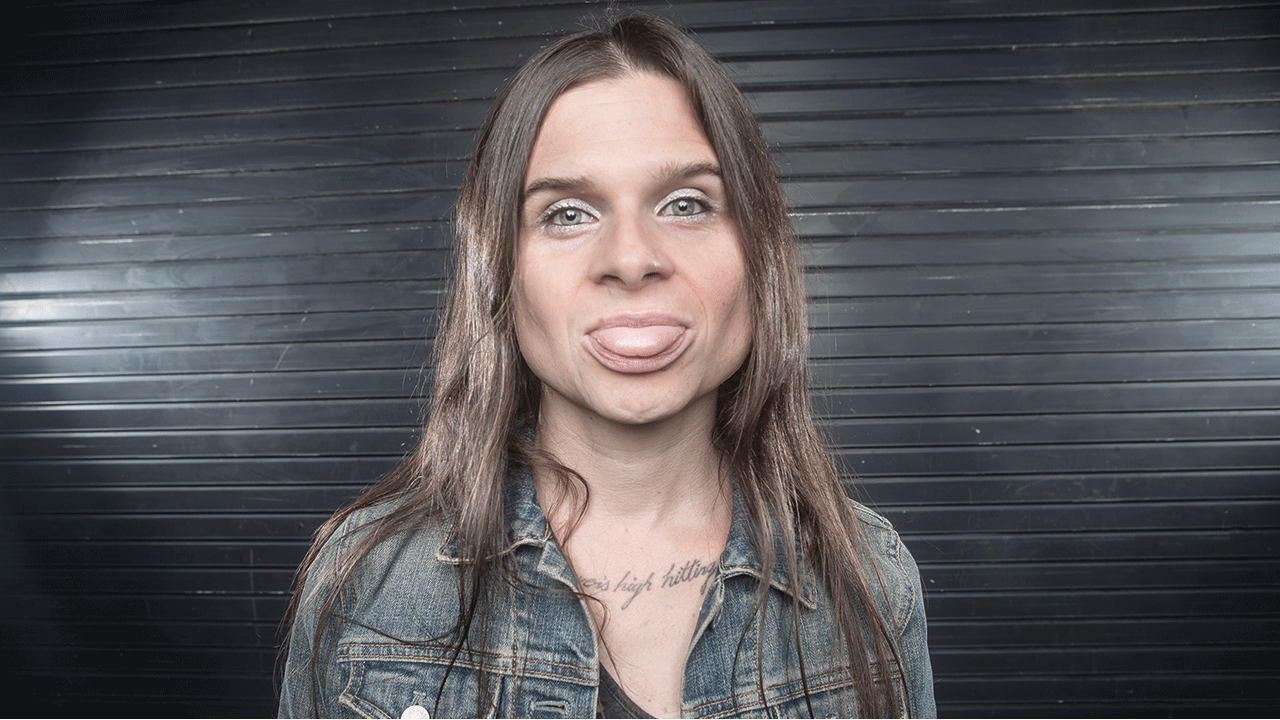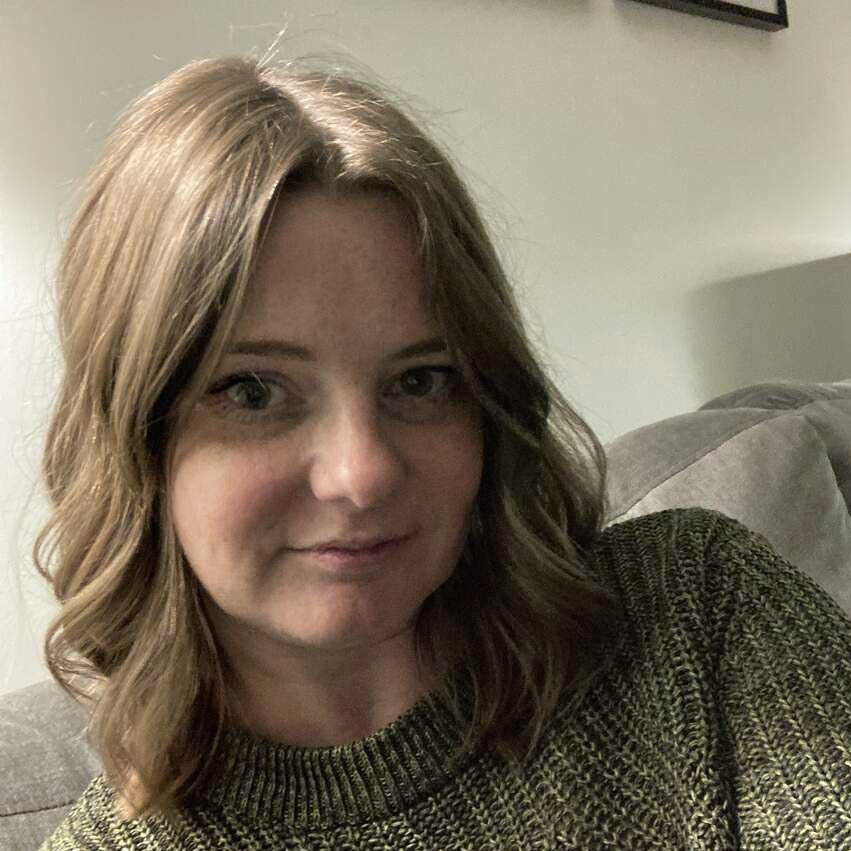When Life Of Agony broke through in 1993, the New York metal scene they called home was drowning in testosterone. Hardcore was getting harder, the crowds more violent. Signed to Roadrunner, LOA helped herald the tough new generation of the label’s family alongside Machine Head, Type O Negative and Sepultura. Their debut album, River Runs Red, was uncompromisingly aggressive, as were the live shows – the video for Through And Through nails the vibe, finding them slamming it in a moshpit amid the most bro-heavy mob of flailing, shirtless limbs.
“We grew up as angst-ridden teenage boys,” says vocalist Mina Caputo. “Beating people up in the street, setting cars on fire. We did fucking crazy things, we did boy things. But then I’d go home and steal some pantyhose out of my aunt’s drawers!”
We first meet Mina minutes after she’s come offstage, having performed to a sold-out crowd at London’s Electric Ballroom. She’s tiny, the result of years of yoga practice, and dressed casually in black leggings and a loose grey vest, her hair tied up in a topknot. She’s instantly engaging, curling up onto a sofa backstage, offering a light handshake and insisting we share the veggie pizza she’s just had delivered. But 12 years ago, we’d spent time with Keith Caputo, the name Mina was given at birth, as LOA promoted a reunion tour after their first split. “Was I an asshole?” she asks in her broad New York accent when we remind her. No, we say, but you were withdrawn, shy, a bit intense. The contrast to the gregarious character who greets us today is like night and day (although she’s still pretty intense). And now it all makes sense – the toxic masculinity she was once surrounded by was literally killing her.
She was born 43 years ago to heroin addict parents, both of whom died from the drug – she never knew her mother. She was raised by her grandparents, and by the time she was 16, she was starting to explore her sexuality in secret. Keith ran riot on the streets of New York, scoring drugs, drinking and starting fights, spiralling into the family pattern of self-destruction. Suicidal thoughts were common. It was only when Mina dropped the mask and began gender therapy in 2008, coming out as a transgender woman in 2009, that life started to come together for her.
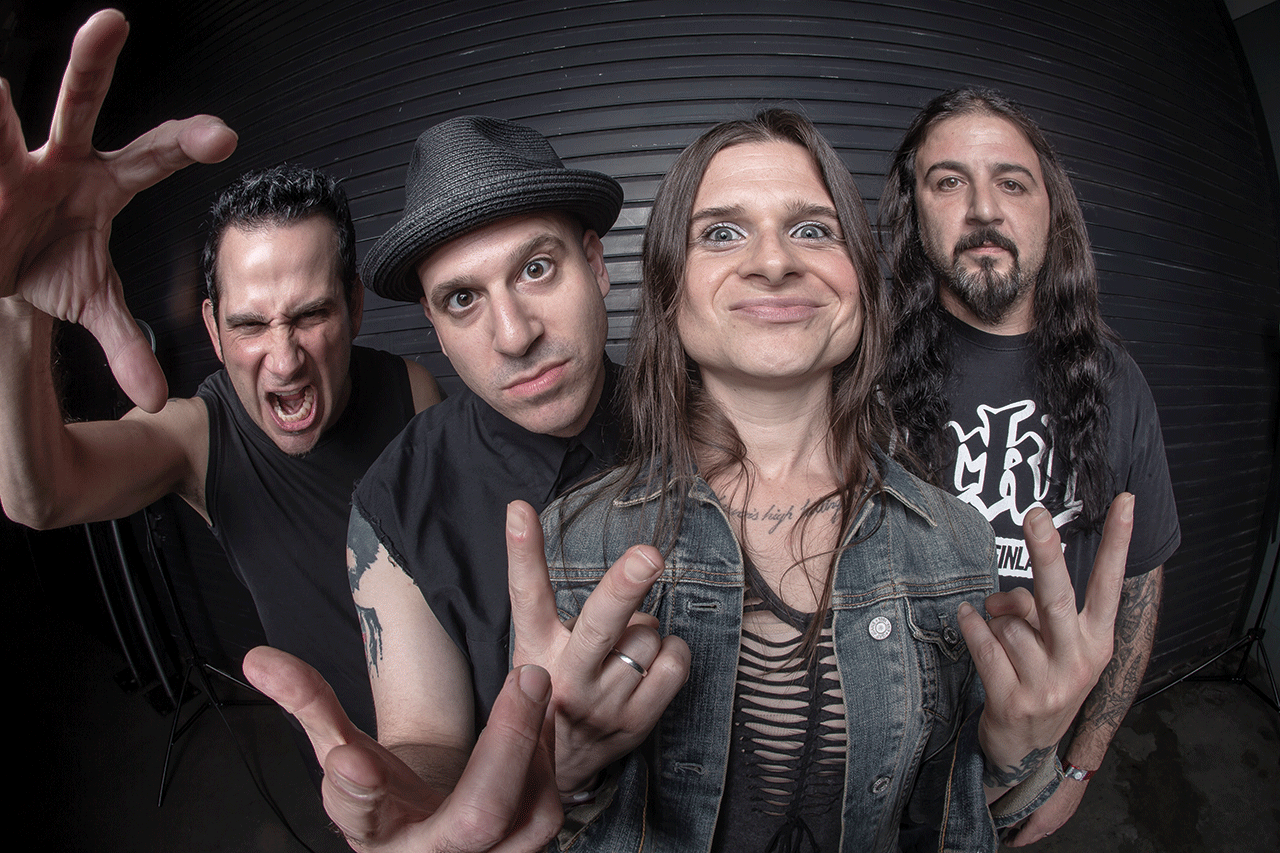
“The more you focus on beauty, the more beauty will come to you,” she says, in the first of many zen self-help statements. “That’s why you need to be clear and focused, and that’s why you need to honour yourself. And my entire life I knew this, but I wasn’t doing it, and it was killing me. I was doing all of these bad drugs, I was getting into trouble, I thought I was definitely going to head down the path that my mom and dad went down because I was scared. This band, we built our careers on that alpha male, stereotypical thing. But people in my family always knew. I was open, my cousin knew, Sal [Abruscato, drums] knew. All the girlfriends I dated, I told them. That’s why the relationships never lasted, because here I am pretending to be a boy talking to a girl, and it’s just a psychological trauma that I can’t even put into words. The struggle is real.”
Certainly, not everyone reacted positively to her news. A quick look online reveals some predictably aggressive, boneheaded opinions from neanderthal keyboard warriors after LOA announced their 2014 reunion following their second split. And she says she lost friends and family members after coming out. It’s shocking and senseless, a throwback to outdated attitudes that have no place in modern society, but she seems relatively unfazed by the vocal minority revealing their own insecurities through their outrage.
“Yeah, I lost some people, so what?” she says. “Fuck it! I lost the two most important people in my life; my mother, who I had never known, and my dad, both heroin addicts. Both OD’d on junk. But I’m out there, I’m creating, I’m exercising my desires in my life. A lot of people, they’re afraid to do that. My biggest fear was to come out. I feared that more than I feared death. Death to me was just going to be this wonderful transformation. But people come and go. That’s the lesson I’ve been learning my entire life.”
Almost a year later, and we’re on a Skype call to Mina. She’s in her little New York apartment on a snowy day, dressed in her pyjamas and snuggled under a pink blanket with her beloved Chihuahua, Toni. In the time that’s passed, she’s released Love Hard, one of her many, many solo albums, and has just finished work on A Place Where There’s No More Pain, the first Life Of Agony album since 2005’s Broken Valley.
“It’s very dark,” she says of LOA’s comeback. “Ferocious. Nothing like the other records. I think our fans need to expect that, and not expect River Runs Red again. We wouldn’t be able to do that. We’ve evolved so much. It’s very colourful, very dark, lyrically it’s a monster. That aspect of the band hasn’t changed. But the maturity of the music, the intention behind it, that’s all changed.”
It certainly shouldn’t be seen as her coming-out record – that happened with 2009’s Cheat, a solo covers EP featuring Lou Reed’s Make Up (Lou Reed’s a huge inspiration – at one point she leaps up to show us a guitar strap he once owned, given to her by LOA’s producer Matt Brown), Cyndi Lauper’s Girls Just Want To Have Fun and Antony And The Johnsons’ For Today I Am A Boy, but she says “no one got” the fact she was alluding to her transition. And it’s just as vicious as anything they’ve done in the past, Sal Abruscato, guitarist Joey Z and bassist Alan Robert laying down punishing, heavy screeds of alternative metal over which Mina is free to unleash the potent fury she still possesses (in conversation, occasional flashes of anger surface, against a generation expecting to get their music for free, for example – her tough inner-streetkid making it clear you’d be unwise to cross her). After years of on-again, off-again turmoil, it seems to reset the band to zero. The initial reunion was, she admits, awkward (“I didn’t know how it would be received. Insecurities. I hadn’t seen Sal in years”). But cutting out all the negative influences they could identify – Mina says she no longer parties or drinks, is focused on health and happiness, and they’ve reduced the crew to the bare minimum – has given them a fresh start.
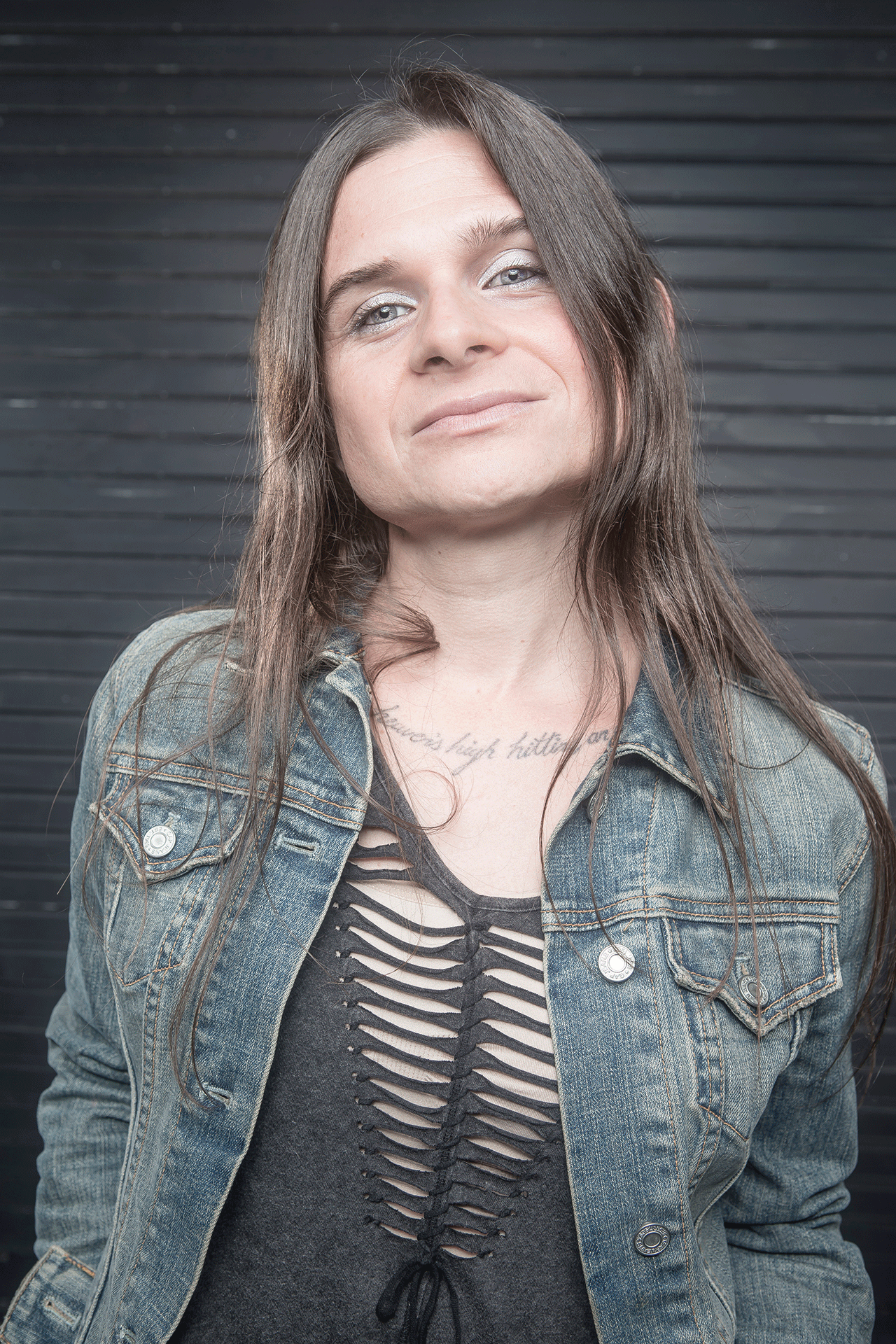
“I love them,” she says of her bandmates. “We’re not in our 20s anymore, we just want to have a great time. We want everyone to be on point, do a great job, have the right attitude. And not just the band, everyone that surrounds the band. We fired everyone. We don’t have management. It’s just the band, and, when we go out on the road, a tour manager. No more fucking drug-addict crew members, no more people that are going to rob us. We’re keeping it really, really small.
“We realised our mistakes,” she continues. “We realised through the years a lot of the shit that used to get in between the band was everyone else around us.”
And how have the guys reacted to the new dynamic?
“It’s just got more loving,” she says. “They carry my luggage, they’re all very sweet to me, they get it. It was instant. You know what was bad? I lied to them. I didn’t tell them the full story over the years. I should have shared more with Alan, but I didn’t because it was a hard thing for me to do.”
She’s certainly making up for that now. It’s hard to imagine Mina ever having trouble talking. You don’t really interview her as such, you just strap yourself in and prepare for the barrage of thoughts to come tumbling out of her head. And that’s important. The trans community has been silenced and marginalised for far too long, and while the metal scene prides itself on being a close-knit family, picking up anyone who falls down in the metaphorical pit, those nasty online barbs prove that we have a long, long way to go to ensure that we make this club welcoming to all. Inclusiveness is strength, and so the fact that Mina is out there being herself, not taking any shit, and not being afraid, is an inspiration that we can only hope encourages anyone going through the things that she has. We’re already seeing seeds of change – Mina has toured with Laura Jane Grace of Against Me!, who also came out as transgender in 2012. And despite arguments over America’s intensely stupid bathroom bill, people from across the whole spectrum of sexuality and gender are standing up, being seen and being counted. Everyone deserves to live without having to lie, fake it and hide who they really are.
“You know, when I first came out, it was mostly men,” she says of the prejudice she faced from some quarters. “Most men are dumb, they don’t understand. They think with their dicks, they’re fuelled by testosterone. I was there. I gave up my manhood. All the men in my family I looked down upon. All the women in my family I looked up to. The women were the ones with the pure energy that were all about unconditional love. The men were all about tension, war. Men are fuckin’ stupid. I’m not delusional. I know I’ve been born anatomically with a male figure. But through the works of hormones, I’m good friends with my body now.”
We’ve been talking for an hour, and by now Toni the Chihuahua is snoring happily on Mina’s lap. The scene is a picture of pure contentment, of a human being who has truly faced down the biggest fears anyone could have and kicked them squarely in the arse. And that’s the person you’ll hear on A Place Where There’s No Pain – a badass broad who stared down hell and won. And if that’s not metal as fuck, we don’t know what is.
“The world needs our fucking record,” she says in a final moment of self-affirmation. “No hard rock band is putting out records like this. No depth of mind, no depth of soul. I’m really fucking super-excited and super-proud.”
A Place Where There’s No More Pain is out April 28 via Napalm
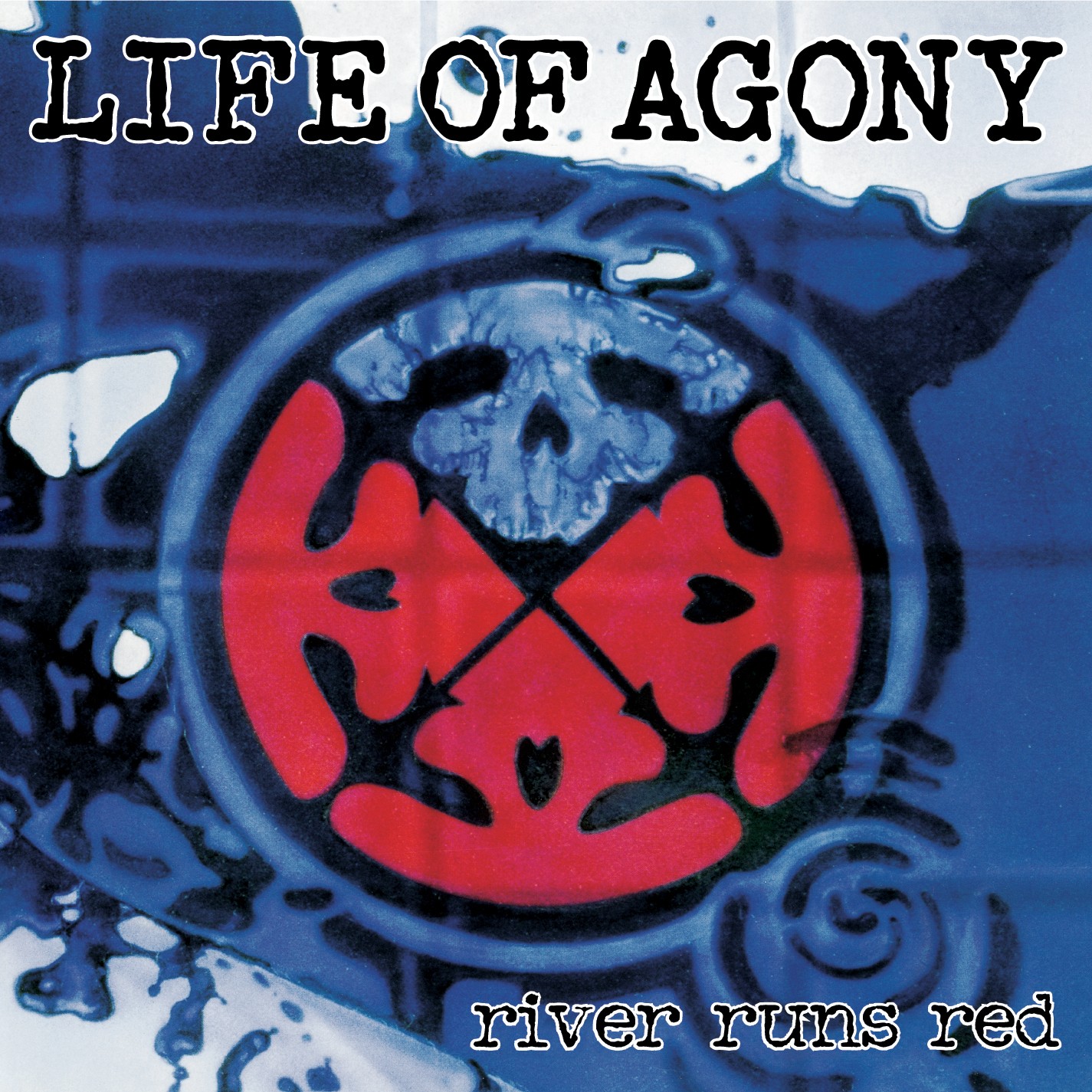
Growing Pains
Where to start with Life Of Agony’s back catalogue
River Runs Red (Roadrunner, 1993)
With elements of grunge, hardcore and groove metal, this horrifying concept album paints a grim picture of abuse, abandonment, hopelessness and suicide. Alan Robert wrote all of the songs, and it’s a truly bleak listen, Caputo’s throaty howls battling guitarist Joey Z’s vicious, sabre-edged riffs and the rhythm section’s merciless pummelling. Ending with the sound of blood dripping away, River Runs Red takes intensity to a whole new level.
Ugly (Roadrunner, 1995)
They polished things up for album two, dropping the raw hardcore edges in favour of their more accessible side, nodding towards the likes of Stone Temple Pilots. Caputo’s vocals are more natural, no longer forced down into Hell. But the angst is still present in lyrics like, ‘I’m lost at 22, and I don’t know if my life’s gonna end up right’. It even features a gothic take on Simple Minds’ 80s pop classic Don’t You Forget About Me. Sal Abruscato quit the band after touring the album.
Soul Searching Sun (Roadrunner, 1997)
Caputo left after this album, and it’s not hard to hear why: it’s the sound of a group whose hearts aren’t in it and who aren’t gelling artistically. It often falls into cliché, and while it has its moments, as on the gloomy Alice In Chains groove of Hope, they weren’t enough to save the band. After limping on with – of all people – Ugly Kid Joe’s Whitfield Crane installed as their new singer, they called it a day in 1999.
Broken Valley (Epic, 2005)
New York reunion shows with the original lineup in 2003 led to their fourth album, and rather than attempting to simply recreate River Runs Red, they cherrypicked the strong points of all three previous albums, allowing themselves to take the raw fury of their debut and combine it with the pop-rock nous of its descendants. The always emotional lyrics, meanwhile, meant they slotted right in alongside the emo boom of the era. They split up again in 2012.
Life Of Agony - A Place Where There's No More Pain album review
Life Of Agony: “We finally got to make the record we’ve been dying to make”
